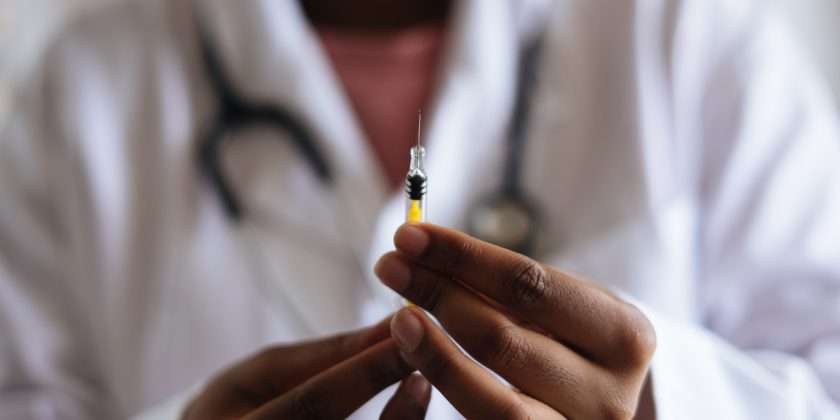- Clarification on the 4-day grace period for administration of the second dose of vaccine
- Updated recommendations regarding vaccine coadministration
- Clarification on passive antibody therapy and vaccine administration
- Updated information on the management of anaphylaxis
Background
The Advisory Committee on Immunization Practices (ACIP) has issued interim recommendations for the use of Pfizer-BioNTech and Moderna COVID-19 vaccines for the prevention of coronavirus disease 2019 (COVID-19) in the United States. Both vaccines are lipid nanoparticle-formulated, nucleoside-modified mRNA vaccines encoding the prefusion spike glycoprotein of SARS-CoV-2, the virus that causes COVID-19.
These interim CDC clinical considerations are informed by data submitted to the Food and Drug Administration (FDA) for Emergency Use Authorization (EUA) of the vaccines, other data sources, general best practice guidelines for immunization, and expert opinion. These considerations for mRNA vaccines only apply to the currently authorized vaccine products in the United States (i.e., Pfizer-BioNTech and Moderna COVID-19 vaccines). Considerations will be updated as additional information becomes available or if additional vaccine products are authorized.
In addition to the following considerations, the EUA conditions of use and storage, handling, and administration procedures described in the prescribing information should be referenced when using the Pfizer-BioNTechexternal icon and Modernaexternal icon COVID-19 vaccines. 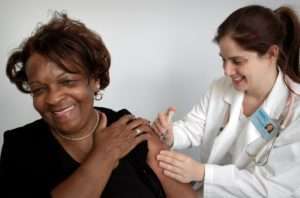
Authorized age groups
Under the EUAs, the following age groups are authorized to receive vaccination:
- Pfizer-BioNTech: ages ≥16 years
- Moderna: ages ≥18 years
Children and adolescents outside of these authorized age groups should not receive COVID-19 vaccination at this time.
Administration
The mRNA COVID-19 vaccine series consists of two doses administered intramuscularly:
- Pfizer-BioNTech (30 µg, 0.3 ml each): 3 weeks (21 days) apart
- Moderna (100 µg, 0.5 ml): 1 month (28 days) apart
Persons should not be scheduled to receive the second dose earlier than recommended (i.e., 3 weeks [Pfizer-BioNTech] or 1 month [Moderna]). However, second doses administered within a grace period of 4 days earlier than the recommended date for the second dose are still considered valid. Doses inadvertently administered earlier than the grace period do not need to be repeated. There is no maximum interval between the first and second doses for either vaccine. Therefore, if the second dose is administered >3 weeks after the first Pfizer-BioNTech vaccine dose or >1 month after the first Moderna vaccine dose, there is no need to restart the series. Vaccine administration errors should be reported to the Vaccine Adverse Event Reporting System (VAERS).
Interchangeability with other COVID-19 vaccine products
Either of the currently authorized mRNA COVID-19 vaccines can be used when indicated; ACIP does not state a product preference. However, these mRNA COVID-19 vaccines are not interchangeable with each other or with other COVID-19 vaccine products. The safety and efficacy of a mixed-product series have not been evaluated. Both doses of the series should be completed with the same product. However, if two doses of different mRNA COVID-19 vaccine products are inadvertently administered, no additional doses of either product are recommended at this time. Recommendations may be updated as further information becomes available or other vaccine types (e.g., viral vector, protein subunit vaccines) are authorized.
Coadministration with other vaccines
Given the lack of data on the safety and efficacy of mRNA COVID-19 vaccines administered simultaneously with other vaccines, the vaccine series should routinely be administered alone, with a minimum interval of 14 days before or after administration with any other vaccine. However, mRNA COVID-19 and other vaccines may be administered within a shorter period in situations where the benefits of vaccination are deemed to outweigh the potential unknown risks of vaccine coadministration (e.g., tetanus toxoid-containing vaccination as part of wound management, measles or hepatitis A vaccination during an outbreak) or to avoid barriers or delays to mRNA COVID-19 vaccination (e.g., in long-term care facility residents or healthcare personnel who received influenza or other vaccinations prior to/upon admission or onboarding). If mRNA COVID-19 vaccines are administered within 14 days of another vaccine, doses do not need to be repeated for either vaccine.
Booster doses
The need for and timing of booster doses for mRNA COVID-19 vaccines has not been established. No additional doses beyond the two-dose primary series are recommended at this time.
Vaccination of persons with a SARS-CoV-2 infection or exposure
Persons with a current or prior history of SARS-CoV-2 infection
Data from clinical trials indicate that mRNA COVID-19 vaccines are safe in persons with evidence of a prior SARS-CoV-2 infection. Vaccination should be offered to persons regardless of history of prior symptomatic or asymptomatic SARS-CoV-2 infection. Viral testing to assess for acute SARS-CoV-2 infection or serologic testing to assess for prior infection solely for the purposes of vaccine decision-making is not recommended.
Vaccination of persons with known current SARS-CoV-2 infection should be deferred until the person has recovered from the acute illness (if the person had symptoms) and criteria have been met for them to discontinue isolation. This recommendation applies to persons who develop SARS-CoV-2 infection before receiving any vaccine doses as well as those who develop SARS-CoV-2 infection after the first dose but before receipt of the second dose. While there is otherwise no recommended minimum interval between infection and vaccination, current evidence suggests that reinfection is uncommon in the 90 days after the initial infection. Thus, persons with documented acute SARS-CoV-2 infection in the preceding 90 days may delay vaccination until near the end of this period, if desired.
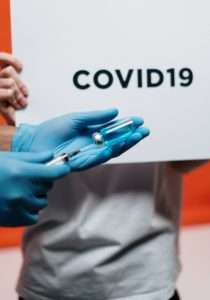
Vaccinated persons who subsequently develop COVID-19
For vaccinated persons who subsequently develop COVID-19, prior receipt of an mRNA COVID-19 vaccine should not affect treatment decisions (including use of monoclonal antibodies, convalescent plasma, antiviral treatment, or corticosteroid administration) or timing of such treatments.
Residents with a known COVID-19 exposure living in congregate healthcare settings (e.g., long-term care facilities), where exposure and transmission of SARS-CoV-2 can occur repeatedly for long periods of time, maybe vaccinated. In these settings, healthcare personnel are already in close contact with residents (e.g., entering patient rooms for evaluation and treatment). Vaccinators should employ appropriate infection prevention and control procedures.
Residents of other congregate settings (e.g., correctional and detention facilities, homeless shelters) with a known COVID-19 exposure may also be vaccinated, in order to avoid delays and missed opportunities for vaccination given the increased risk for outbreaks in these settings. However, where feasible, precautions should be taken to limit mixing exposed individuals with other residents or staff (except those essential for the provision of vaccination services, who should employ appropriate infection and control procedures).
In situations where facility-wide testing is being conducted to identify SARS-CoV-2 infections, facilities should attempt to complete facility-wide testing within a period that allows for test results to be received prior to vaccination in order to isolate those patients with SARS-CoV-2 infection. However, it is not necessary to wait for test results if this would create delays in vaccination. In such situations, persons without symptoms consistent with COVID-19 may be vaccinated. Although not contraindicated, vaccination may be deferred pending the outcome of testing in persons with symptoms consistent with COVID-19. Viral testing for acute SARS-CoV-2 infection solely for the purposes of vaccine decision-making is not recommended.
Vaccination of persons with underlying medical conditions
mRNA COVID-19 vaccines may be administered to persons with underlying medical conditions who have no contraindications to vaccination (see ‘contraindications’ section below). Clinical trials demonstrated similar safety and efficacy profiles in persons with some underlying medical conditions, including those that place them at increased risk for severe COVID-19, compared to persons without comorbidities. Information on groups with specific underlying medical conditions is included below.
Immunocompromised persons
Persons with HIV infection or other immunocompromising conditions, or who take immunosuppressive medications or therapies might be at increased risk for severe COVID-19. Data are not currently available to establish vaccine safety and efficacy in these groups. Persons with stable HIV infection were included in mRNA COVID-19 vaccine clinical trials, though data remain limited. Immunocompromised individuals may receive COVID-19 vaccination if they have no contraindications to vaccination. However, they should be counseled about the unknown vaccine safety profile and effectiveness in immunocompromised populations, as well as the potential for reduced immune responses and the need to continue to follow all current guidance to protect themselves against COVID-19 (see below). Antibody testing is not recommended to assess for immunity to COVID-19 following mRNA COVID-19 vaccination.
At this time, re-vaccination is not recommended after immune competence is regained in persons who received mRNA COVID-19 vaccines during chemotherapy or treatment with other immunosuppressive drugs. Recommendations on re-vaccination or additional doses of mRNA COVID-19 vaccines may be updated as additional information is available.
Persons with autoimmune conditions
No data are currently available on the safety and efficacy of mRNA COVID-19 vaccines in persons with autoimmune conditions, though these persons were eligible for enrollment in clinical trials. No imbalances were observed in the occurrence of symptoms consistent with autoimmune conditions or inflammatory disorders in clinical trial participants who received an mRNA COVID-19 vaccine compared to placebo. Persons with autoimmune conditions who have no contraindications to vaccination may receive an mRNA COVID-19 vaccine.

Persons with a history of Guillain-Barré syndrome
To date, no cases of Guillain-Barré syndrome (GBS) have been reported following vaccination among participants in the Pfizer-BioNTech or Moderna COVID-19 vaccines clinical trials. With few exceptions, ACIP’s general best practice guidelines for immunization does not include the history of GBS as a contraindication or precaution to vaccination. Persons with a history of GBS may receive an mRNA COVID-19 vaccine unless they have a contraindication to vaccination. Any occurrence of GBS following mRNA COVID-19 vaccination should be reported to VAERS.
Persons with a history of Bell’s palsy
Cases of Bell’s palsy were reported following vaccination in participants in both the Pfizer-BioNTech and Moderna COVID-19 vaccines clinical trials. However, the FDA does not consider these to be above the frequency expected in the general population and has not concluded that these cases were causally related to vaccination. Post-authorization safety surveillance will be important to further assess any possible causal association. In the absence of such evidence, persons with a history of Bell’s palsy may receive an mRNA COVID-19 vaccine unless they have a contraindication to vaccination. Any occurrence of Bell’s palsy following mRNA COVID-19 vaccination should be reported to VAERS.
Vaccination of pregnant or lactating people
Pregnant people
Observational data demonstrate that while the absolute risk is low, pregnant people with COVID-19 have an increased risk of severe illness, including illness resulting in intensive care admission, mechanical ventilation, or death. Additionally, they might be at an increased risk of adverse pregnancy outcomes, such as preterm birth.
There are currently few data on the safety of COVID-19 vaccines, including mRNA vaccines, in pregnant people. Limited data are currently available from animal developmental and reproductive toxicity studies. No safety concerns were demonstrated in rats that received the Moderna COVID-19 vaccine prior to or during gestation in terms of female reproduction, fetal/embryonal development, or postnatal development. Studies in pregnant people are planned and the vaccine manufacturers are following outcomes in people in the clinical trials who became pregnant. Based on current knowledge, experts believe that mRNA vaccine are unlikely to pose a risk to the pregnant person or the fetus because mRNA vaccines are not live vaccines. The mRNA in the vaccine is degraded quickly by normal cellular processes and does not enter the nucleus of the cell. However, the potential risks of mRNA vaccines to the pregnant person and the fetus are unknown because these vaccines have not been studied in pregnant people.

There is no recommendation for routine pregnancy testing before receipt of a COVID-19 vaccine. Those who are trying to become pregnant do not need to avoid pregnancy after mRNA COVID-19 vaccination.
Lactating people
There are no data on the safety of COVID-19 vaccines in lactating people or the effects of mRNA COVID-19 vaccines on the breastfed infant or milk production/excretion. mRNA vaccines are not thought to be a risk to the breastfeeding infant. A lactating person who is part of a group recommended receiving a COVID-19 vaccine (e.g., healthcare personnel) may choose to be vaccinated.
Vaccination of children and adolescents
Adolescents aged 16–17 years are included among persons eligible to receive the Pfizer-BioNTech COVID-19 vaccine under the EUA. While vaccine safety and efficacy data in this age group are limited, there are no biologically plausible reasons for safety and efficacy profiles to be different than those observed in persons 18 years of age and older. Adolescents aged 16–17 years who are part of a group recommended receiving a COVID-19 vaccine may be vaccinated with the Pfizer-BioNTech COVID-19 vaccine with appropriate assent. Children and adolescents younger than 16 years of age are not authorized to receive the Pfizer-BioNTech COVID-19 vaccine at this time.
Children and adolescents younger than 18 years of age are not authorized to receive the Moderna COVID-19 vaccine at this time.
Patient counseling
Vaccine efficacy
Preliminary data suggest high vaccine efficacy in preventing COVID-19 following receipt of two doses of mRNA COVID-19 vaccine (Pfizer-BioNTech: 95.0% [95% CI: 90.3%, 97.6%]; Moderna: 94.1% [95% CI: 89.3%, 96.8%]). Limited data are currently available regarding the efficacy of a single dose. Patients should be counseled on the importance of completing the two-dose series (of the same vaccine product) to optimize protection.
Reactogenicity
Before vaccination, providers should counsel mRNA COVID-19 vaccine recipients about expected local (e.g., pain, swelling, erythema at the injection site, localized axillary lymphadenopathy on the same side as the vaccinated arm) and systemic (e.g., fever, fatigue, headache, chills, myalgia, arthralgia) post-vaccination symptoms. Depending on vaccine product (Pfizer vs. Moderna), age group, and vaccine dose, approximately 80–89% of vaccinated persons develop at least one local symptom and 55–83% develop at least one systemic symptom following vaccination.
Most systemic post-vaccination symptoms are mild to moderate in severity, occur within the first three days of vaccination, and resolve within 1–3 days of onset. These symptoms are more

frequent and severe following the second dose and among younger persons compared to older persons (i.e., >55 or ≥65 years [for Pfizer-BioNTech or Moderna vaccines, respectively]). Unless persons develop a contraindication to vaccination (see below), they should be encouraged to complete the series even if they develop local or systemic symptoms following the first dose to optimize protection against COVID-19.
In clinical trials, hypersensitivity-related adverse events were observed in 0.63% of participants who received the Pfizer-BioNTech COVID-19 vaccine and 1.5% of participants who received the Moderna COVID-19 vaccine, compared to 0.51% and 1.1%, respectively, in the placebo groups. Anaphylaxis following vaccination was not observed in the Pfizer-BioNTech or Moderna COVID-19 vaccines clinical trials. However, anaphylactic reactions have been reported following receipt of mRNA vaccines outside of clinical trials.
Antipyretic or analgesic medications (e.g., acetaminophen, non-steroidal anti-inflammatory drugs) may be taken for the treatment of post-vaccination local or systemic symptoms, if medically appropriate. However, routine prophylactic administration of these medications for the purpose of preventing post-vaccination symptoms is not currently recommended, as information on the impact of such use on mRNA COVID-19 vaccine-induced antibody responses is not available at this time.
Infection prevention and control considerations are available for healthcare personnel and long-term care facility residents (e.g., populations included in phase 1a of vaccine allocation) with systemic signs and symptoms following COVID-19 vaccination. Considerations may be updated as additional information becomes available or additional groups are prioritized for vaccine allocation.
Public health recommendations for vaccinated persons
Given the currently limited information on how much the mRNA COVID-19 vaccines may reduce transmission in the general population and how long protection lasts, vaccinated persons should continue to follow all current guidance to protect themselves and others. This includes wearing a mask, staying at least 6 feet away from others, avoiding crowds, washing hands often, following CDC travel guidance, following quarantine guidance after an exposure to someone with COVID-19, and following any applicable workplace or school guidance, including guidance related to personal protective equipment use or SARS-CoV-2 testing.
Contraindications and precautions
While rare, anaphylactic reactions have been reported following vaccination with mRNA COVID-19 vaccines. Although investigations are ongoing, persons with a history of an immediate allergic reaction (of any severity) to an mRNA COVID-19 vaccine or any of its components might be at greater risk for anaphylaxis upon re-exposure to either of the currently authorized mRNA COVID-19 vaccines. For the purposes of this guidance, an immediate allergic reaction to a vaccine or medication is defined as any hypersensitivity-related signs or symptoms such as urticaria, angioedema,

Recommendations for contraindications and precautions are described below and summarized in Appendix A. The following recommendations may change as further information becomes available.
Contraindications
CDC considers a history of the following to be a contraindication to vaccination with both the Pfizer-BioNTech and Moderna COVID-19 vaccines:
- Severe allergic reaction (e.g., anaphylaxis) after a previous dose of an mRNA COVID-19 vaccine or any of its components
- Immediate allergic reaction of any severity to a previous dose of an mRNA COVID-19 vaccine or any of its components (including polyethylene glycol [PEG])*
- An immediate allergic reaction of any severity to polysorbate (due to potential cross-reactive hypersensitivity with the vaccine ingredient PEG)*
* These persons should not receive mRNA COVID-19 vaccination at this time unless they have been evaluated by an allergist-immunologist and it is determined that the person can safely receive the vaccine (e.g., under observation, in a setting with advanced medical care available). See Appendix B for more information on ingredients included in mRNA COVID-19 vaccines.
Persons with an immediate allergic reaction to the first dose of an mRNA COVID-19 vaccine should not receive additional doses of either of the mRNA COVID-19 vaccines. Providers should attempt to determine whether reactions reported following vaccination are consistent with immediate allergic reactions versus other types of reactions commonly observed following vaccination, such as a vasovagal reaction or post-vaccination side effects (which are not contraindications to receiving the second vaccine dose) (Appendix C).
Healthcare personnel or health departments in the United States can request a consultation from the Clinical Immunization Safety Assessment COVIDvax project for a complex COVID-19 vaccine safety question about an individual patient residing in the United States not readily addressed by CDC guidance.
Precautions
CDC considers a history of any immediate allergic reaction to any other vaccine or injectable therapy (i.e., intramuscular, intravenous, or subcutaneous vaccines or therapies not related to a component of mRNA COVID-19 vaccines or polysorbate) as a precaution but not a contraindication to vaccination for both the Pfizer-BioNTech and Moderna COVID-19 vaccines. These persons should be counseled about the unknown risks of developing a severe allergic reaction and balance these risks against the benefits of vaccination. Deferral of vaccination and/or consultation with an allergist-immunologist may be considered until further information on the risk of anaphylaxis is available. The following considerations can be used to help the provider conduct a risk assessment for mRNA COVID-19 vaccination in these individuals:
- Risk of exposure to SARS-CoV-2 (e.g., because of residence in a congregate setting such as a long-term care facility, occupation)
- Risk of severe disease or death due to COVID-19 (e.g., because of age, underlying medical conditions)
- Whether the patient has previously been infected with SARS-CoV-2 and, if so, how long ago
- Note: Vaccination is recommended for persons with a history of COVID-19; however, because reinfection is uncommon in the 90 days following infection, persons with a precaution to vaccination and recent COVID-19 may choose to defer vaccination until further information is known about the risk of anaphylaxis following vaccination.
- The unknown risk of anaphylaxis (including fatal anaphylaxis) following mRNA COVID-19 vaccination in a person with a history of an immediate allergic reaction to other vaccines or injectable therapies
- The ability of the patient to be vaccinated in a setting where appropriate medical care is immediately available for anaphylaxis
Neither contraindications nor precautions to vaccination
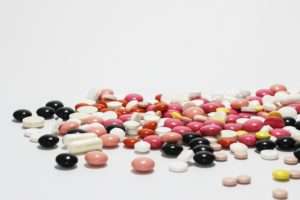
Allergic reactions (including severe allergic reactions) not related to vaccines, injectable therapies, components of mRNA COVID-19 vaccines (including PEG), or polysorbates, such as food, pet, venom, or environmental allergies, or allergies to oral medications (including the oral equivalents of injectable medications) are not a contraindication or precaution to vaccination with either mRNA COVID-19 vaccine. The vial stoppers of these mRNA vaccines are not made with natural rubber latex, and there is no contraindication or precaution to vaccination for persons with a latex allergy. In addition, as the mRNA COVID-19 vaccines do not contain eggs or gelatin, persons with allergies to these substances do not have a contraindication or precaution to vaccination.
Observation periods following vaccination (for persons without contraindications to mRNA COVID-19 vaccines)
CDC recommends an observation period following vaccination with mRNA COVID-19 vaccines. Persons with a history of an immediate allergic reaction of any severity to a vaccine or injectable therapy and persons with a history of anaphylaxis due to any cause should be observed for 30 minutes. All other persons should be observed for 15 minutes.
Management of anaphylaxis after mRNA COVID-19 vaccination
Appropriate medical treatment used to manage immediate allergic reactions must be immediately available in the event an acute anaphylactic reaction occurs following administration of mRNA COVID-19 vaccine. Administration of antihistamines to COVID-19 vaccine recipients prior to vaccination to prevent allergic reactions is not recommended. Antihistamines do not prevent anaphylaxis, and their use may mask cutaneous symptoms, which could lead to a delay in the diagnosis and management of anaphylaxis.
Further information on anaphylaxis management can be found in the interim considerations for the management of anaphylaxis following COVID-19 vaccination and laboratory evaluation of persons who experience anaphylaxis after vaccination.
Reporting of vaccine adverse events
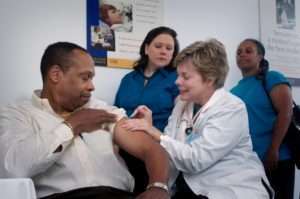
Adverse events that occur in a recipient following mRNA COVID-19 vaccination should be reported to VAERS. Vaccination providers are required by the Food and Drug Administration to report the following that occurs after mRNA COVID-19 vaccination under Emergency Use Authorization:
- Vaccine administration errors
- Serious adverse events
- Cases of Multisystem Inflammatory Syndrome
- Cases of COVID-19 that result in hospitalization or death
Reporting is encouraged for any other clinically significant adverse event even if it is uncertain whether the vaccine caused the event. Information on how to submit a report to VAERS is available at https://vaers.hhs.govexternal icon or by calling 1-800-822-7967.
In addition, CDC has developed a new, voluntary smartphone-based tool, v-safe. This tool uses text messaging and web surveys to provide near real-time health check-ins after patients receive COVID-19 vaccination. Reports to v-safe indicating a medically significant health impact, including pregnancy, are followed up by the CDC/v-safe call center to collect additional information to complete a VAERS report, if appropriate.
Jay Harold hopes you enjoyed this post, “COVID19 Vaccines: Jan. 2021 CDC.” Please share it and read more about Jay Harold here. Please take this advice from Muhammad Ali and give it back to others. “Service to others is the rent you pay for your room here on earth.”

